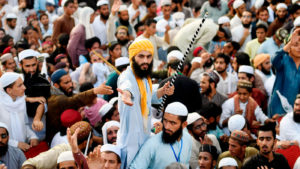Life has come full circle for Imran Khan. In 2018, he was elected to be prime minister of Pakistan after his predecessor, Nawaz Sharif, was disqualified over corruption charges resulting from the Panama Papers. Khan stated at the time that he, too, should be ejected if found guilty of anything similar, going so far as to say that he didn’t mind security agencies tapping his phone. Five years later, Khan has got what he wished for. On Tuesday, he was barred from politics for five years, a few days after he received a three-year jail sentence for corruption.
Khan has been found guilty of abusing his privileges, with the court verdict concluding that he provided “false and inaccurate” information about gifts he received as Pakistan’s head of government. But he has been embroiled in over 100 other cases. One arose after the UK’s National Crime Agency returned £190 million to Pakistan, the result of an investigation into real estate magnate Malik Riaz’s money laundering. Khan is accused of returning the money to Riaz, then receiving land worth $24.7 million from him. The trial addressing these allegations saw the former premier briefly arrested in May. Violent protests erupted against the military establishment, which was accused of orchestrating Khan’s arrest.
The Pakistan Army has a long history of meddling with politics. The government here has long been subservient to the military establishment, and the army is uncomfortable with popular civilian leaders such as Khan. By the time he was ousted in a No Confidence vote last April, he had completely fallen out with the army leadership. This was partly a result of Khan’s own antagonistic behaviour; in 2021, for instance, he named a new secret service chief, even though such appointments are only the prerogative of the prime minister in theory, and almost always dictated by the army chief in practice.
And yet, that same military establishment was undoubtedly empowered by Khan. His government extended the tenure of the then-chief of the army General Qamar Javed Bajwa, whom Khan described as the most “democratic and neutral” army chief in Pakistan’s history. In a typical turn of events, Khan’s party now holds Bajwa singlehandedly responsible for his regime’s exit.
Yet Khan was not unusual in toeing the military’s line. His successor Shehbaz Sharif, who is the younger brother of his predecessor, has reached new lows of subservience. His government has since passed bills allowing intelligence agencies to search any home without a warrant, as well as legislation giving the state absolute control over the citizen’s digital presence. It has likewise allowed the expansion of the Pakistani Taliban into new territories, unleashing jihadist turf wars that most recently saw Isis bomb a rally last week.
In discussing the current political scenario, then, we are not just discussing a former prime minister’s arrest or one man’s political future. We are talking about the demise of democracy in Pakistan, and the completion of the military’s behind-the-scenes takeover.
During this process, the army has not simply obliterated the civilian leadership; it has made a point of humiliating it. It engineered the rise of former cricketer Khan — on the platform of an independent party he set up himself — to tackle the dominance of the two major parties. The Pakistan Muslim League and the Peoples Party of Pakistan were used to going head-to-head, only occasionally worrying about the threat of military-pushed Islamist parties siphoning off votes. After Khan’s election in 2018, however, both parties were horrified that a complete outsider could manufacture enough popularity to triumph at the polls. In response, parties that once demanded that Pakistan “respect for people’s vote” and described democracy as “the best revenge” were vocally critical of a democratic result.
But it was only a matter of time before humiliation came for Khan, too. Naïve and pompous, he considered himself above the establishment’s game, and mistook his fabricated popularity for real power. The man who weaponised “anti-corruption” discourse has been helping the military enrich itself, to the tune of billions of dollars. Now, he has been certified corrupt through the same channels that he once used to undermine his opponents. Khan’s party might survive the removal of its head, but the dilapidated remains are likely to be used by the military as a pawn to keep its own monopoly in tact.
The army is all too aware that there is one thing that would actually challenge its hegemony: all parties, having been thoroughly disgraced by the establishment, coming together and saying enough is enough. With Khan’s party neutralised and the two major ones looking forward to battling it out in another election, this has now become a political impossibility in Pakistan. The army can sit back and watch the show, as civilians accuse each other of licking military boots — sometimes quite literally on live TV — while nobody admits their own role in fortifying the establishment.
The people of Pakistan can therefore look forward to the further militarisation of the state, Islamisation of the society, and pulverisation of the economy. We will have to continue coping with the decisions of an unaccountable military establishment, having been unequivocally abandoned by self-serving demagogues, of which Imran Khan is only the latest. After 15 years of ostensibly free and fair elections, one of the world’s newest democracies has died young.
Disclaimer
Some of the posts we share are controversial and we do not necessarily agree with them in the whole extend. Sometimes we agree with the content or part of it but we do not agree with the narration or language. Nevertheless we find them somehow interesting, valuable and/or informative or we share them, because we strongly believe in freedom of speech, free press and journalism. We strongly encourage you to have a critical approach to all the content, do your own research and analysis to build your own opinion.
We would be glad to have your feedback.
Source: UnHerd Read the original article here: https://unherd.com/


